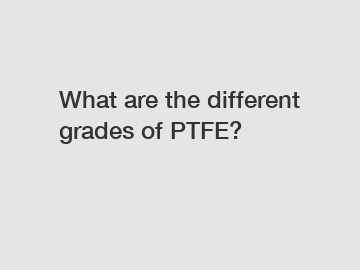What are the different grades of PTFE?
When it comes to applications requiring exceptional chemical resistance, low friction, and high-temperature resistance, PTFE (Polytetrafluoroethylene) is the undisputed champion. This versatile material has revolutionized numerous industries, from manufacturing and aerospace to healthcare and electronics. But, did you know that there are different grades of PTFE developed to suit specific requirements? In this blog, we will explore these grades, their unique properties, and the industries that benefit from them.
1. PTFE Granular (Virgin) Grade:
As the purest form of PTFE, the granular or virgin grade boasts exceptional chemical resistance and a low coefficient of friction. Its high molecular weight enables it to exhibit its outstanding properties, making it ideal for applications ranging from gaskets and seals to bearings and insulators. Virgin grade PTFE is often chosen for highly critical applications where purity and performance are paramount, such as pharmaceuticals, food processing, and semiconductor industries.

2. PTFE MicroPowder Grade:
PTFE MicroPowder, typically obtained by the controlled size reduction of PTFE resin, offers improved lubricity and anti-sticking properties compared to the granular grade. Due to its fine particle size, it can be easily dispersed in other materials such as oils, greases, and plastics, enhancing their performance. The MicroPowder grade finds applications in coatings for molded parts, lubricants, and additives for high-performance polymers where reduced friction is desired.
3. PTFE Fine Powder (Free Flowing) Grade:
PTFE Fine Powder, also known as free-flowing PTFE resin, possesses excellent flow characteristics, making it easy to handle and process during fabrication. This grade retains the chemical resistance and low friction of PTFE but is specifically formulated for applications such as wire insulation, tubing, molded parts, and extruded films. Free-flowing PTFE allows for precise shaping and molding of intricate components without compromising performance.
4. PTFE Mechanical Grade:
PTFE Mechanical Grade is fortified with specific fillers or additives to enhance its mechanical properties. By incorporating materials like glass fibers, carbon, graphite, or bronze, the resulting composite grade achieves improved wear resistance, thermal conductivity, and compressive strength while retaining PTFE's inherent chemical resistance. Mechanical grade PTFE finds applications in piston rings, bearings, and seals in reciprocating equipment, as well as in structural components within high-demand environments.
5. PTFE Expanded (EPTFE) Grade:
PTFE Expanded (EPTFE) Grade stands out for its unique structure, combining microporous fibers with superior chemical resistance. This grade allows gases and liquids to pass through while blocking the passage of particles, making it ideal for applications such as filtration media, gaskets, and breathable membranes. Expanded PTFE's versatility is particularly valuable in industries like medical, automotive, and environmental, where precise filtration and sealing capabilities are essential.
Conclusion:
From its original iconic discovery to its various grades today, PTFE continues to prove its significance across multiple industries. By understanding the different grades available, one can choose the optimal PTFE formulation for their specific application, ensuring improved performance, high reliability, and longevity. Whether you require superior chemical resistance, reduced friction, or enhanced mechanical properties, PTFE has a grade tailored to meet your needs. Embrace the possibilities that this remarkable material offers, and let its versatility take your projects to new heights.
Contact us to discuss your requirements of PTFE Molded Tube, ptfe film roll, ptfe plastic sheet. Our experienced sales team can help you identify the options that best suit your needs.

Comments